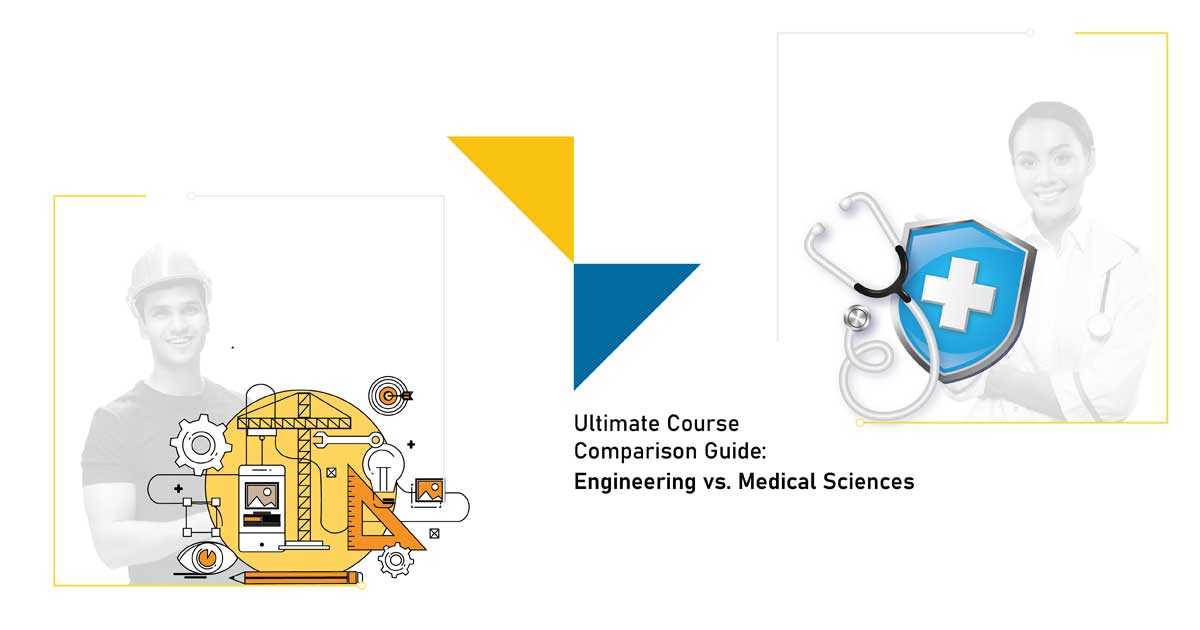Blog Detail


Ultimate Course Comparison Guide: Engineering vs. Medical Sciences
16-10-2023

When it comes to choosing a career path after pre-university or 12th grade, two popular choices emerge engineering or medical sciences. The engineering vs. medical debate is common among students, given that both fields are highly sought-after in India and often lead to rewarding career prospects. Today, in this blog, we shall provide an ultimate course comparison between engineering and medical sciences.
Engineering vs. Medical Sciences: A General Overview
| Parameters | Engineering | Medical Science |
| Career Objective | Engineering primarily focuses on designing, building, and maintaining systems, structures, devices, and processes. | Medical Sciences focus on the study of the human body, diseases, diagnosis, treatment, and healthcare. |
| Eligibility | 10+2 (Physics, Chemistry, and Mathematics) | 10+2 (Physics, Chemistry, and Biology) |
| Entrance Exams | Joint Entrance Exams (JEE) Main, Under–Graduate Engineering Entrance Exam (Uni-GAUGE), Consortium of Medical, Engineering and Dental Colleges of Karnataka (ComedK) and other state entrance exams | National Eligibility cum Entrance Test (NEET) |
Engineering vs. Medical Sciences: Course Duration
The undergraduate degree courses in engineering are Bachelor of Engineering (B.E) and Bachelor of Technology (B.Tech) with specialisations in mechanical, electrical, civil, computer science, electronics, aerospace engineering, and many others. The duration of these programmes is 4 years, divided into 8 semesters. Furthermore, one can pursue a Master’s degree in the same field, which is a 2-year programme divided into 4 semesters.
The undergraduate degree programme in Medical Sciences is Bachelor of Medicine, Bachelor of Surgery (MBBS), with a duration spanning between 5 and 6 years. An individual can pursue further education in this field by either opting for a Master of Surgery (M.S) or a Master of Medicine (M.D). Post-completion of master’s degrees, one can also pursue higher education by opting for fellowships or doctorate certifications in specific fields.
Engineering vs. Medical Sciences: Course Curriculum
Both disciplines are unique and impart critical skills and knowledge in their respective fields. Besides the theoretical exposure, both engineering and medical sciences curricula offer practical training and exposure to students with the help of internships and onsite project visits. Let us see some of the core subjects covered in each curriculum.
Core Subjects in Engineering:
- Calculus
- Physics
- Mechanics
- Thermodynamics
- Electromagnetism
- Materials Science
- Computer Programming
- Engineering Graphics and Design
- Probability and Statistics
- Electrical Circuits
- Control Systems
- Fluid Mechanics
- Heat Transfer
- Machine Design
- Structural Analysis
- Environmental Engineering
- Engineering Ethics and Professionalism
- Project Management
Core Subjects in Medical Sciences:
- Anatomy
- Physiology
- Biochemistry
- Pharmacology
- Pathology
- Microbiology
- Immunology
- Genetics
- Medical Ethics and Professionalism
- Clinical Medicine
- Surgery
- Obstetrics and Gynecology
- Paediatrics
- Internal Medicine
- Radiology
- Psychiatry
- Emergency Medicine
- Public Health
- Epidemiology
- Medical Research and Clinical Trials
Engineering vs. Medical Sciences: Career Opportunities
Both engineering and medical sciences offer diverse career advancement opportunities for individuals upon graduation. Engineering professionals are consistently in demand due to their skills in designing, building, and maintaining critical infrastructure and technology. Similarly, medical sciences professionals are also in demand due to the ageing population, increasing healthcare needs, and advancements in medical technology. Let us see some of the career prospects in both fields:
Career Opportunities in Engineering
The need for modern infrastructure and advanced technology has paved the way for engineers to explore diverse career prospects across different industries. Let us see some of the high-demand career roles in this field.
- Civil Engineer: Civil engineers design and oversee the construction of infrastructure projects, including buildings, bridges, roads, and water supply systems.
- Mechanical Engineer: Mechanical engineers work on the design, development, and maintenance of mechanical systems and devices, such as machines, engines, and HVAC systems.
- Electrical Engineer: Electrical engineers focus on the design and maintenance of electrical systems, including power generation, electronics, and telecommunications.
- Computer Engineer: Computer engineers develop hardware and software systems, including computer components, networks, and embedded systems.
- Software Engineer: Software engineers design, develop, and maintain software applications and systems for various platforms and industries.
Career Opportunities in Medical Sciences
Good Health has always been a need for people for ages, and therefore professionals in medical sciences are often highly regarded for saving the lives of patients during emergencies. The demand for these specialists will always be high, and thus, we have presented some of the key career roles that one can pursue in this discipline:
- General Physician: General Physicians provide primary healthcare services, diagnose illnesses, and offer treatment to patients.
- Specialist Doctor: Specialist Doctors pursue advanced training in specific medical fields like cardiology, surgery, paediatrics, or radiology to become specialists in that area.
- Surgeon: Surgeons perform surgical procedures, ranging from general surgery to specialised surgeries such as orthopaedic, cardiovascular, or neurosurgery.
- Anesthesiologist: Anesthesiologists administer anaesthesia during surgeries and monitor patients' vital signs.
- Radiologist: Radiologists interpret medical images (X-rays, CT scans, and MRIs) to diagnose conditions and diseases.
Engineering vs. Medical Sciences: Final Thoughts
Despite the never-ending debate over which career path to pursue, it is important that one understands the complexity of each course and chooses wisely. Pursuing a career path in these fields requires extensive dedication and commitment. Therefore, an individual must assess their skill set, interests, and future aspirations before choosing a career in either of these fields. If one is good with numerals, physics, or experiments, then one should opt for engineering. However, if an individual wants to build a career based in the field of life sciences and human anatomy, then a degree in medical sciences is an ideal choice.